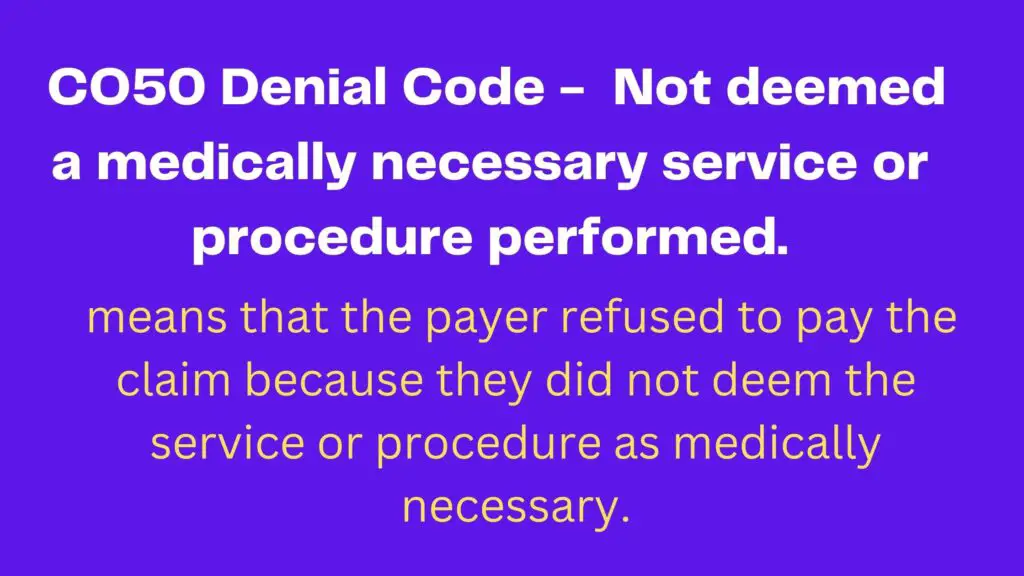The CO 50 denial code in medical billing is an important code that indicates the insurance company has deemed the services billed as not medically necessary. This determination means that the insurance provider does not consider the services or procedures performed as essential for the diagnosis or treatment of the patient’s treatment, based on their specific policies and guidelines.
For example, consider a situation where a patient undergoes a series of advanced imaging tests, like multiple MRIs, for a normal headache. The healthcare provider submits the claims for these services to the insurance company. However, the insurance company reviews the case and determines that such extensive imaging was not medically necessary for a common headache, which could have been initially assessed with less invasive and less expensive methods. Therefore, they issue a denial with the code CO 50, indicating that they will not cover the costs of the MRIs because they don’t see them as essential for treating the patient’s condition.
Table of Contents
- Reason for Medical Necessity Denial (Denial Code 50)
- How To Handle CO 50 Denial Code:
- Appeal Process in CO50 Medical Necessity Denial
- Related Articles:
In such cases, the medical provider can respond to a CO 50 denial by providing additional information or documentation to support the medical necessity of the services. This might include detailed medical records, notes justifying the necessity of the procedure, or guidelines showing that the procedure is considered standard for the condition treated. If the insurance company remains unconvinced, the patient might be responsible for the cost of the services.

Reason for Medical Necessity Denial (Denial Code 50)
In medical billing, the CO 50 denial code, indicating a lack of medical necessity, can be triggered by various reasons. These reasons reflect the insurance company’s assessment that the services provided do not meet their criteria for medical necessity. Some common scenarios include:
- Exceeding Physical Therapy Limits:
- When a patient receives physical therapy sessions beyond the maximum number allowed by their insurance plan within a calendar year, insurers may deny additional sessions. Each plan has predefined limits on the number of covered physical therapy sessions, and exceeding this limit is seen as not medically necessary.
- Hospital Stay Beyond Approved Duration:
- Insurance plans often have specific limits on the length of hospital stays for particular conditions or procedures. If a patient’s hospitalization exceeds this pre-approved duration, the additional days may be deemed not medically necessary, leading to a denial of coverage for the extra days.
- Use of Medications for Cosmetic Purposes:
- Insurances typically cover medications for therapeutic and health-related reasons. If a medication is prescribed for cosmetic purposes, such as for improving appearance without a medical indication, it may be considered not medically necessary and thus not covered.
- Administering Treatments in Costlier Settings:
- When a treatment or procedure could be performed in a less expensive setting (like an outpatient facility) but is instead administered in a more costly setting (like a hospital), insurers may view this as not medically necessary. The rationale is that a lower-cost setting would have been adequate for the required care.
In case you receive this denial, it is almost guaranteed that the claim cannot be sent for a recheck as well. In such cases the decision of the Medicare payer is final.
Under no circumstances will they agree to pay for the claim as they have their own team of experts who assess whether or not the product was required for the patient.
But there is a certain way to get that fixed as well. There is a window period of around 120 days. If you send the claim for reassessment and attach valid proof with the same that testifies why you needed the service or the product, the decision might come back in your favour.
Also Read : PR 27 Denial Code Descriptions – Coverage Terminated
How To Handle CO 50 Denial Code:
Insurance companies and other payers use medical necessity to determine whether they will cover the costs associated with a particular service. They evaluate the medical documentation submitted by healthcare providers to determine if the service meets the necessary criteria for coverage.
Medical necessity can vary depending on the specific insurance plan, the patient’s condition, and the requested service type. Healthcare providers need to document and justify the medical necessity of their services to ensure proper reimbursement and avoid potential disputes with payers.
Ultimately, medical necessity is a safeguard to promote the appropriate use of healthcare resources while ensuring patients receive necessary and beneficial medical care.
In case if you received the denial of Medical Necessity from Medicare or any other insurance in that case please follow the below steps
1- First we need to check with the coding team that the billed diagnosis codes are correctly billed or not, if they pass the claim the 2nd step follows.
2- If insurance said the specific service or procedure is not deemed medically necessary with the main service in that sent medical documents with appeal letter as proof the service or procedure is necessary for the patient.
3- Client SOP instructions are also important so as per SOP need to follow the denial handling is a must.
All information is resources from authorized web portals and government sites, if any discrepancy is found please contact us and we will do the corrections.
Note- Medical Necessity Denial also known as LCD/NCD Denials. The remittance advice can contain following codes in place of CO50 sometimes like CO-57, CO-151, N-115 all these are also Medical Necessity denial codes along with CO50 code.
As per CMS guideline need to check the LCD or NCD prior to service to determine eligibility of services for patient. If the service performed is not covered under the LCD guidelines, so need to provide patients with an ABN (Advance Beneficiary Notice) prior to performing these tests.
Appeal Process in CO50 Medical Necessity Denial
Appealing CO 50 medical necessity denials, though challenging, is a crucial process in medical billing. Here’s a step-by-step approach to handle these denials effectively:
- Identify the Specific Denial Reason:
- Despite receiving a CO 50 denial code, it’s vital to understand the exact reason behind the denial. Generic codes can be misleading. Contact the payer to get a detailed explanation of why the claim was denied. This information is essential for preparing an effective appeal.
- Use Correct Claim Number on Appeals:
- When resubmitting or appealing a claim, use the original claim number but make sure to indicate that it’s a corrected or appealed claim. This prevents the claim from being rejected as a duplicate. Properly marking the claim helps in tracking and differentiating it from the original submission.
- Document All Correspondences with Payers:
- Keep detailed records of all interactions with the insurance company, including dates, reference numbers, and the names of representatives you speak with. This documentation is invaluable if you need to make multiple calls or references to specific conversations during the appeal process.
- Regular Follow-up on Submitted Appeals:
- After resubmitting a claim, it’s crucial to follow up regularly, at least once a month. Regular follow-ups ensure that your claim doesn’t get overlooked and keeps the appeal process moving forward.
- Submit Well-Documented Appeal Letters:
- Your appeal letters should be clear and concise, including essential details like the claim number, patient information, service date, provider number, and member ID. Attach all relevant supporting documentation to strengthen your case. Ensuring accuracy and completeness in the first submission of an appeal can significantly increase the chances of a favorable outcome.
These steps, when executed diligently, enhance the likelihood of successfully overturning a CO 50 denial, thereby ensuring that healthcare providers are fairly compensated for medically necessary services rendered.
Related Articles:
- CO 50 Denial Code Description – Medical Necessity Denial
- CO 23 Denial Code Description (2026)
- Denial Code PR 204 Description (2026)
- Medical Billing Denial Codes List (2026)
- BCBS Commercial Insurance Denial Codes (2026)
The author and contributor of this blog "NSingh" is working in Medical Billing and Coding since 2010. He is MBA in marketing and Having vaste experience in different scopes of Medical Billing and Coding as AR-Follow-up, Payment Posting, Charge posting, Coding, etc.

